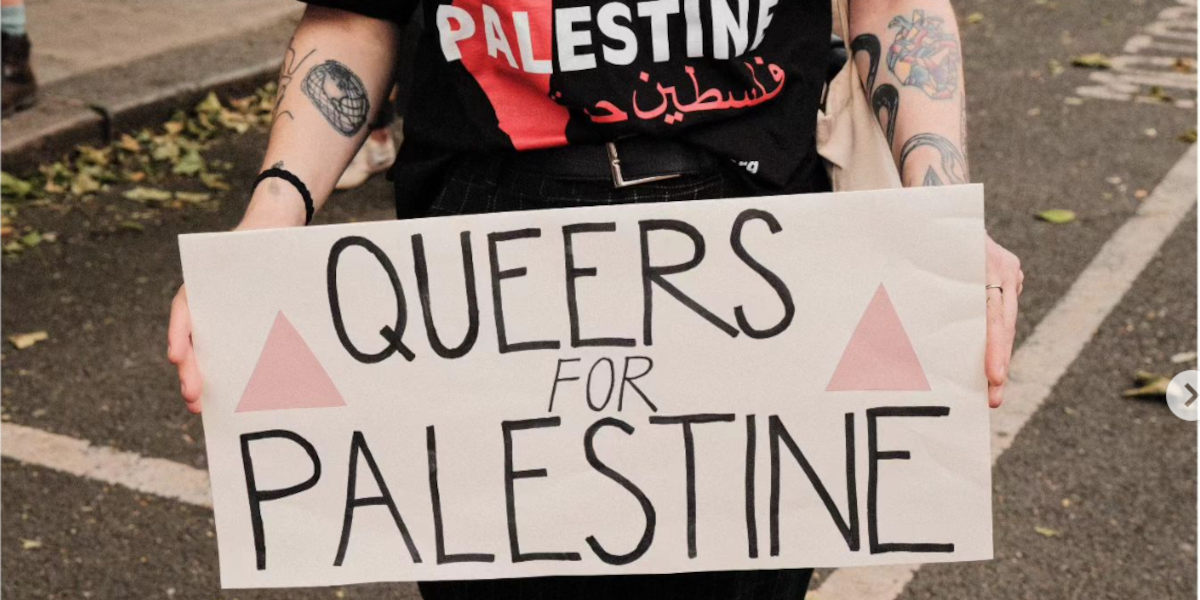Explicitly queer fronts are emerging both within wider activist movements and to demand change within LGBTIQ+ institutions and organisations. They have much more than LGBTIQ+ liberation in their sights.
Since the onset of Israel’s ongoing assault on Gaza, Queers for Palestine (QFP) have been a permanent fixture at marches for Palestine – part of a Queer Bloc uniting Lesbians and Gays Support the Migrants, London Trans Pride, Fossil Free Pride (FFP) and more. They blockaded Elbit in April, and called on the BBC and UK contestant Olly Alexander to boycott the Eurovision song contest over a months-long campaign.
The same groups have been publicly holding Pride in London to account through a series of open letters, callout posts and explainers on the event’s ties to Israeli occupation, collaboration with police and unethical sponsors. On June 22, activists disrupted Cardiff Pride on similar grounds.
A rapidly-mobilised grassroots campaign quickly has successfully pressured Pride Edinburgh to drop Aegon sponsorship over ties to weapons, defence and supplies trading with Israel. Another coalition has mobilised the No Pride in Genocide campaign, targeting the British LGBT+ Awards for nominating weapons manufacturer BAE and holding a protest outside the ceremony.
Connected struggles
These actions are informed by activists’ understanding of an internationally shared queer struggle. The already-marginalised status of many queer and trans people renders them more vulnerable to the impacts of climate change, like rising food prices, displacement, destruction of key resources and homelessness.
FFP campaigner, Beth*, told me, ‘Queer people in the Global South are suffering first and worst on the frontlines of the climate crisis and the resource extraction driving it. That demands solidarity and action from queer people in the heart of the empire, profiting from it’.
Already-marginalised queer and trans people are particularly vulnerable to the impacts of climate change, like rising food prices, displacement, destruction of key resources and homelessness
The Dyke Project (TDP) was founded in response to rising gender-critical action in London. The group made headlines in October 2023 when they replaced tube adverts with messages from queer Palestinians taken from Queering the Map. Members of the group told me that they took action because ‘the same systems of racial capitalism and colonialism that harm queer people in the UK harm all Palestinians – including queer and trans Palestinians’.
Highlighting queer Palestinian lives flies in the face of mainstream characterisations of the Middle East as irredeemably homophobic – which TDP members describe as ‘one of the ways that Zionists justify Israel’s ongoing genocide of Palestinians’. Their point is made when Israeli soldiers placing pride flags in the rubble of Gaza is promoted on Israel’s official Instagram page.
As members of Pinkwashing UK explained, such Israeli propaganda ‘promotes a progressive image of the apartheid state, weaponising queer bodies to provide cover for ethnic cleansing and genocide’. For Beth, this ‘pinkwashing’ means ‘entities publicly placing themselves in close proximity to queer culture, queer people or queer aesthetics in order to associate themselves with socially progressive values’.
When Barclays Bank temporarily swap their logo out for a rainbow version, or Primark releases pride-themed clothing, their goal is not queer liberation but image-cleansing and distraction from social harms – from investments in weapons manufacturers to wage theft.
Identity politics?
Strides in marriage equality, anti-discrimination laws and legal recognition of gender diversity over recent decades have resulted in what Beth calls a ‘corporate capture of queer culture’. This capture demands that we celebrate arms manufacturer BAE for being ‘LGBT-inclusive’ – as if the end goal of inclusion is to be allowed complicity in international warfare.
Meanwhile, critics of QFP argue that queer people should be grateful for ‘Western-won freedoms’ – and that being queer is incompatible with support for Palestinian liberation. As Chiamaka Muoneke recently reminded us, however, homophobic laws across the world are legacies of British colonial imposition. In Israel, a ’proudly homophobic’ politician props up a far-right government.
When Barclays Bank post a rainbow logo, their goal is not queer liberation but image-cleansing and distraction from their investments in weapons manufacturers
As a queer person, it’s jarring to have my identity weaponised in this way, particularly when my inclusion has always felt conditional at best. As Schuyler Mitchell notes, backlash from pro-Israel actors hinges on a homophobic and transphobic rejection of unsanitised, anti-normative queer identity. If we are allowed only to be palatably queer within the boundaries of social norms – without questioning who is excluded and harmed by those norms – then ‘something is deeply broken in queer politics’, as Beth put it, adding that ‘it’s our collective responsibility to recenter solidarity’.
Members of TDP told me that ‘Many of us in the queer community acknowledge that Pride emerged out of queer people’s resistance to policing – but we’re not always willing to confront the same conditions of surveillance, violence and control in the present’. Pinkwashing UK told me that ‘protest is our collective queer history, but it should also be our collective present’ – and yet, feels like queer radicalism is acceptable only in past tense.
Today, when queer people are a vocal and oppositional force within their own institutions – like protesting Prides or fossil-fuel sponsored awards shows – they are at best dismissed. Worse, they are accused of choosing the wrong target, met with justifications for taking dirty money, or face violent repression.
A strong queer liberation movement defined by collaboration and solidarity is coming together against the odds. By building a broad coalition of queer activists united across the intersecting movements – for environmentalism, internationalism, anti-imperialism and anti-Zionism – we can redefine what it means to be proud of our identities, and demand better from our community and beyond.
*Names have been changed










